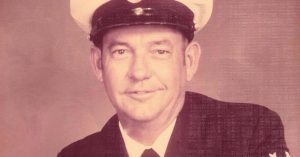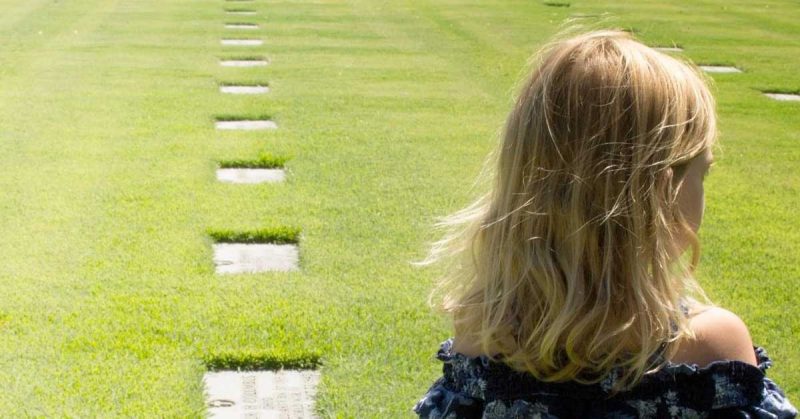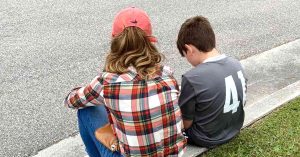There is a quote that I’ve held on tight to in the last few years: “Be the things you love most about the people who are gone.” To me (and bear with me because I’m going to let my English-degree brain analyze this), it calls attention to a delicate piece of healing after loss — the turn off the beaten path of grief and toward a future where the responsibility to keep a legacy present lies with us.
As I sit here in my sun-soaked office writing this blog, my eyes wander to all the little reminders of military service and the special people I’ve known who bravely volunteered to defend our country and all that we hold dear. Behind me, there’s a framed collection of my grandpa’s U.S. Navy flight suit patches. To my left is my daughter’s award-winning illustration of a C-130 Angel Flight, and on the wall next to that is a beautiful portrait of a Michigan poppy field — a reminder of a beautiful surviving mother’s tribute to her son. Situated near the doorway are the pair of ceramic elephants my grandpa brought back from somewhere in Southeast Asia as a gift for my grandma. On the bookshelves are photos in frames from different times in our lives — some of them little paper ghosts of those no longer with us — and little mementos that probably just look like clutter unless you’re clued in to the “you just had to be there” story behind each one.
I’ve talked and thought a lot since settling into our new house about these items and others around our home. They are more than reminders of the people we lost, but of the people we should strive to be — considering all the things we loved about those who are gone. It’s the simplest, and perhaps most meaningful, way to honor the lives and service of those we’ve lost.

Honor with Meaning
I think it’s common to think that to honor the life of someone who served in the military, you have to be loud and proud, and there is certainly a time for that. We do, after all, have national holidays that help us never forget the sacrifices they made for our freedom. I would challenge that honoring service and the person who served and died doesn’t have to be saved for Memorial Day or, even more broadly, on Independence Day, Veterans Day or one of the military branch birthdays. Whether they died while serving, from a service-connected injury or illness, or from natural causes after a full life that included service, like my grandpa who served in the Navy and grandma who served in the Army, we can honor them any time in ways that we find meaningful or — if they could be here now — ways that they would find meaningful.
What I Mean by Meaningful
Those ceramic elephants I mentioned were a token of my grandpa’s time in the Navy. I loved those elephants as a kid. They were so colorful, and they seemed gigantic to me as a small child. I would play around with them. I’d stack my toys and cookies snuck from Grandma’s cookie jar on top of them. The possibilities were endless. When I inherited them after my grandparents passed away, I inherited more than the memories I had with them and the way they made me feel connected to my grandparents and, by extension, their military service.
A few Fridays ago, my young nephew was at our house and locked eyes with one of the elephants, and he was hooked. I helped him climb on top so he could pretend he was riding the elephant, and we swapped our best elephant sounds. Now, my first instinct was to distract him from this very breakable thing that is very precious to me, but I paused. I thought less about what I remembered of this same elephant when I was about his size and more about how my grandparents took so much joy from watching me enjoy it. That was one of the things I loved most about them both — stuff was just stuff, and it was meant to be enjoyed. My heart was so full hearing my nephew’s little voice talk to the elephant while he was at our house. A little piece of my grandparents shone through me at that moment. I passed on something that I loved dearly about them, and I don’t know that it gets more meaningful than that.
The ceramic elephants and my grandparents’ service are just one example. Zooming out, we’ve lost great friends and great Marines throughout my husband’s military career, and we remain committed to saying their names often, telling stories about them at every chance we get, and never letting the things they taught us fall away.
There is no shortage of options to honor the fallen, whether they were family or friends made along the way. There are memorial walks and runs, golf tournaments, charitable organizations to donate to, policies to advocate for and monuments to erect. If you can participate, I encourage you to do it! Don’t let the grandness of the gesture intimidate you into thinking this is the only way to honor a hero.
Challenge yourself to strive every day to “be the things you love most about the people that are gone.” Honor them by carrying the best pieces of them forward. And, in that way, they will continue to change the world for the better.





